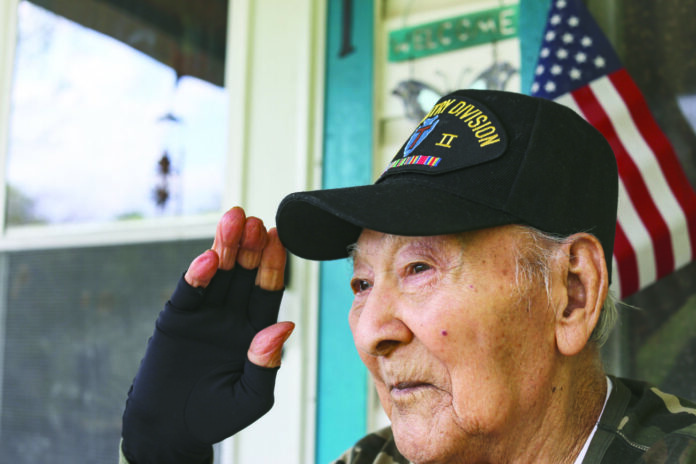SAN BENITO — In a town with no shortage of hometown heroes — as evidenced by the local water tower and the high school football stadium bearing the names of music and sports greats Freddy Fender and Bobby Morrow — there are many figures here who also seem to fall through the cracks of history.

Such is the case for World War II and U.S. Army veteran Saturnino Mares, who up until a decade ago hadn’t publicly shared his harrowing experiences in combat, even witnessing the eruption of Mount Vesuvius. Not with the public; not even with his family.
His daughter said that he began speaking about his ordeal as more attention grew for the plight of veterans.
Born Nov. 28, 1918, Saturnino’s mother did not believe that her son would survive due to the Spanish flu, which at that time was ravaging the country and much of the world.
Still uncertain about a name for her only son, she looked at a calendar and saw that Nov. 29 is the feast day of San Saturnino, the Greek saint and one of the “Apostles to the Gauls.” She took the name and bestowed it upon her son, unsure of his future.
Nearly 102 years later, Saturnino sat inside his San Benito home he built in 1966 on a street named after another hometown hero, Freddy Fender.
His room is modest, but filled with photos documenting his decorated stint in the U.S. Army, as well as photos of his wife Josefina. As he sits in his recliner in the center of his room, he gives a quick update on his status.
“I feel good, I just can’t walk anymore,” he said with a laugh Tuesday afternoon.
Saturnino went to school at Fred Booth Elementary up until he reached the second grade, at which point he quit school and began working in the fields, picking cotton, tomatoes, pickles and watermelons with his family.
He eventually signed up to join the Civilian Conservation Corps, or the CCC, after many of his friends had signed up.
“They used to sign for six months. You’d sign for six months (and) come back,” Saturnino said. “They used to pay you $30 (a month). When we entered the Army, they only paid us $21. I used to send $18 to my mother, and keep $3 for myself.”
In 1941, he decided to join the Army. He signed up for one year. But things didn’t go exactly as he had planned.
“I thought that’s what it was going to be — volunteering for one year — but then when the Japanese bombed Pearl Harbor, they kept us there,” Saturnino recalled. “They said, ‘You’re in the Army now. We don’t know when you’ll go back home.’ That’s what happened.”

And just like that, Saturnino was now in the throes of World War II. Still, he said he wasn’t angry after the Japanese attack on Pearl Harbor on Dec. 7, 1941, a date then-President Franklin D. Roosevelt famously said would live in infamy.
“We weren’t angry because we knew we were going to get something out of it,” Saturnino said.
He was sent to Massachusetts for training before being shipped to North Africa, where his battalion received training in anticipation for an invasion into Italy.
“We trained in North Africa to make the invasion in Italy,” Saturnino said. “We made the invasion in Italy in the middle of the night. There were no planes, no artillery, no boats. Just the infantry.”
Saturnino served in the 36th Infantry Division and the 141st Infantry Company C.
It was while Saturnino was in Italy that Mount Vesuvius — infamous for destroying the city of Pompeii in 79 A.D. — began to erupt on March 17, 1944.
“We were more scared,” he remembered about his experience there. “We were about 30 miles from (Mount Vesuvius), but we thought it was right there. We thought all the fire and sand was going to go over us.”
He would experience many other close calls while deployed in Europe. Just hours after arriving in Germany, he was hit by shrapnel and transported back to Italy where he was awarded the Purple Heart. Later he was injured again in Italy when a bomb went off and a tree branch fell on his back, for which he was awarded the Oak Leaf by four-star General Mark W. Clark.
“We were fighting all the time,” Saturnino said. “Every day we tried to push the Germans back a little. Our fighter planes used to come and bomb their front so we could advance, then we would advance 10 miles or sometimes 50 miles. They started getting short on ammunition, so we started catching a lot of POWs (prisoners of war). We had thousands and thousands of prisoners.
“We were on the frontline. What we’d catch, we’d send it back.”
Saturnino was honorably discharged on Aug., 13, 1945, ending his military career with the Silver Star, Bronze Star, Purple Heart, Oak Leaf, and many other accolades.
With seemingly endless stories to share about his time in the Army, his daughter Rosie Mares said that he never opened up about his experiences until roughly 10 years ago.
“As a matter of fact, I’m just now learning a lot about it,” Rosie said. “He never spoke of it before. Now that there’s been more emphasis on veterans, more of his stories have come out. That’s how I’ve learned more. He doesn’t go into detail, but once in a while he will.”
When asked about his thoughts on Veterans Day, he seemed nonchalant.
“I don’t much care,” Saturnino said, but his pride in having served is overwhelming. “If I didn’t go to the Army, somebody else would have to do it.”




